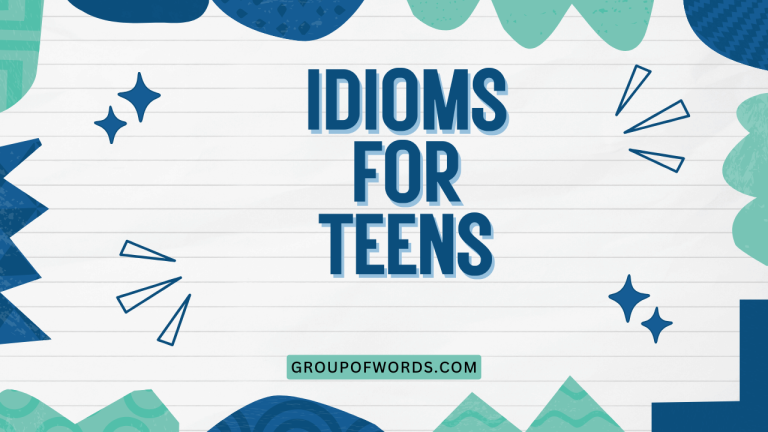Idioms for Old Age: Mastering Figurative Language
Understanding idioms is crucial for mastering English, especially when discussing sensitive topics like aging. Idioms add color and depth to conversations, but they can be confusing for learners if not properly understood.
This article provides a comprehensive guide to idioms related to old age, offering definitions, examples, and practical exercises to help you confidently use these expressions. Whether you’re an ESL student, a language teacher, or simply someone interested in expanding their vocabulary, this guide will equip you with the knowledge to navigate the nuances of English idioms related to aging.
This article will break down the meaning of different idioms related to old age, providing relevant contexts and examples. It will also cover common mistakes to avoid, offering practical exercises to reinforce your understanding.
By the end of this guide, you will be able to recognize, understand, and use these idioms effectively in your everyday conversations.
Table of Contents
- Definition of Idioms for Old Age
- Structural Breakdown
- Types and Categories of Idioms for Old Age
- Examples of Idioms for Old Age
- Usage Rules
- Common Mistakes
- Practice Exercises
- Advanced Topics
- FAQ
- Conclusion
Definition of Idioms for Old Age
Idioms are phrases or expressions whose meanings cannot be understood from the ordinary meanings of the words within them. They add richness and nuance to language, often conveying emotions or situations in a more vivid and concise way than literal language.
When discussing old age, idioms can be particularly useful for expressing the various stages, experiences, and perspectives associated with growing older.
Idioms related to old age can reflect a range of attitudes, from respect and admiration to humor and even gentle criticism. For instance, “over the hill” implies that someone is past their prime, while “a golden oldie” suggests something or someone that is valued and cherished despite their age.
Understanding the connotations and cultural context of these idioms is essential for effective communication.
These idioms often draw on metaphors and analogies related to time, experience, and physical condition. They can also reflect societal attitudes towards aging and the elderly.
Recognizing and understanding these idioms allows for more empathetic and nuanced conversations about aging.
Structural Breakdown
The structure of idioms is often fixed, meaning that the words and their order cannot be changed without altering or losing the idiom’s intended meaning. Idioms may consist of a variety of grammatical structures, including verb phrases, noun phrases, and prepositional phrases.
The key is that the combined meaning of the words is different from the literal meaning of each individual word.
For example, the idiom “long in the tooth” means old or aging. If you were to change it to “tooth in the long” or “long in the teeth,” the meaning would be lost.
This fixed nature is a characteristic feature of idioms and sets them apart from ordinary phrases.
Many idioms relating to old age use metaphorical language to describe the aging process. These metaphors often relate to natural cycles, physical decline, or the accumulation of experience.
Understanding the underlying metaphor can help in grasping the idiom’s meaning and usage.
Types and Categories of Idioms for Old Age
Idioms related to old age can be categorized based on their connotations and the aspects of aging they describe. Here are some categories:
1. Describing Physical Condition
These idioms refer to the physical effects of aging, such as declining health, mobility, or appearance.
2. Describing Mental Acuity
These idioms relate to cognitive abilities and mental sharpness in old age.
3. Describing Life Stage
These idioms refer to the phase of life associated with old age, often focusing on retirement or reflection.
4. Expressing Respect or Affection
These idioms convey positive sentiments towards older people, acknowledging their wisdom and experience.
5. Expressing Negative Sentiments
These idioms express negative views or stereotypes associated with old age.
Examples of Idioms for Old Age
The following examples illustrate the diverse range of idioms used to describe old age. Each example is categorized for clarity and accompanied by a definition and usage example.
Table 1: Idioms Describing Physical Condition
This table provides examples of idioms that describe the physical condition of someone who is getting older. Each idiom includes its meaning and an example of how it might be used.
| Idiom | Meaning | Example |
|---|---|---|
| Long in the tooth | Old or aging | He’s getting a bit long in the tooth to be playing professional football. |
| Over the hill | Past one’s prime; too old to be effective | Some people think he’s over the hill, but he still has a lot to offer. |
| Getting on | Growing older | My grandmother is getting on, but she’s still very active. |
| No spring chicken | Not young anymore | I’m no spring chicken, but I can still run a mile. |
| Under the weather | Not feeling well, often due to age-related health issues | She’s been feeling under the weather lately, probably due to the change in season. |
| As old as the hills | Very old | That joke is as old as the hills. |
| One foot in the grave | Close to death | After the surgery, he felt like he had one foot in the grave. |
| Past it | No longer capable or effective | He’s past it when it comes to technology; he can barely use a smartphone. |
| Slowing down | Becoming less active or energetic due to age | He’s slowing down a bit now that he’s retired. |
| Worn out | Exhausted due to age and wear | The old car was worn out after years of use. |
| Doddering | Walking unsteadily due to old age | The doddering old man slowly made his way across the street. |
| Creaking bones | Experiencing stiffness and pain in the joints due to age | He could feel his creaking bones every morning when he woke up. |
| Losing steam | Becoming less energetic or enthusiastic | After working for so many years, he was starting to lose steam. |
| On its last legs | Near the end of its life or usefulness | The old computer is on its last legs; it’s time to get a new one. |
| Fading fast | Quickly losing strength or health | Her health was fading fast in her final years. |
| Getting frail | Becoming weak and delicate due to old age | She was getting frail and needed more help around the house. |
| Not what one used to be | Not as capable or strong as in the past | He admitted he wasn’t what he used to be, but he still enjoyed his hobbies. |
| Feel one’s age | To be aware of the effects of aging on one’s body | After a long day of gardening, she really felt her age. |
| Declining years | The later years of life, characterized by diminishing health and vitality | He spent his declining years surrounded by family and friends. |
| Past the first flush of youth | No longer young and vibrant | She was past the first flush of youth, but she still had a youthful spirit. |
| Advanced in years | Old, elderly | He was advanced in years but still had a sharp mind. |
| A shadow of one’s former self | Significantly weaker or less capable than in the past | After his illness, he was a shadow of his former self. |
| As weak as water | Very weak | After being sick for so long, he felt as weak as water. |
Table 2: Idioms Describing Mental Acuity
This table presents idioms that describe or relate to the mental acuity of older people. These idioms can reflect perceptions of cognitive abilities as people age.
| Idiom | Meaning | Example |
|---|---|---|
| Losing one’s marbles | Becoming senile or mentally unstable | He’s starting to lose his marbles; he keeps forgetting where he put his keys. |
| Not all there | Mentally confused or not fully alert | She’s not all there sometimes, especially in the evenings. |
| Slipping memory | Gradually losing the ability to remember things | He’s noticed his slipping memory and started writing things down. |
| Second childhood | A period in old age when someone becomes childlike | Some say that old age is like a second childhood. |
| Blanking out | Temporarily losing one’s memory or train of thought | She started blanking out during conversations, which worried her family. |
| Having a senior moment | Experiencing a brief lapse in memory or mental function | I had a senior moment and forgot where I parked the car. |
| Mind like a sieve | Having a very poor memory | He has a mind like a sieve; he can never remember names. |
| Out to lunch | Not paying attention or mentally absent | He seemed a bit out to lunch during the meeting. |
| Senile | Showing a decline in mental ability, especially memory and reasoning | The doctor diagnosed him with senile dementia. |
| Going senile | Becoming senile | She worried she was going senile when she started forgetting familiar faces. |
| Losing it | Becoming mentally unstable | He seemed to be losing it after the death of his wife. |
| Not firing on all cylinders | Not functioning at full mental capacity | He’s not firing on all cylinders today; he must be tired. |
| A bit daft | Slightly foolish or eccentric | He’s a bit daft, but he’s harmless. |
| Soft in the head | Slightly foolish or mentally weak | Some people thought he was soft in the head because he believed in conspiracy theories. |
| Not the sharpest tool in the shed | Not very intelligent | He’s a nice guy, but he’s not the sharpest tool in the shed. |
| A few sandwiches short of a picnic | Not very intelligent or sensible | I think he’s a few sandwiches short of a picnic. |
| One brick short of a load | Not very intelligent or sensible | She’s one brick short of a load. |
| Off one’s rocker | Crazy or eccentric | He’s completely off his rocker. |
| Round the bend | Crazy or eccentric | She’s gone completely round the bend. |
| Batty | Eccentric or slightly crazy | My aunt is a bit batty, but she’s fun to be around. |
| Bonkers | Crazy or foolish | He’s completely bonkers. |
| Mad as a hatter | Completely crazy | He’s as mad as a hatter. |
| Out of one’s tree | Crazy or eccentric | She’s out of her tree. |
Table 3: Idioms Describing Life Stage
This table contains idioms that describe the stage of life associated with old age, including retirement, reflection, and winding down.
| Idiom | Meaning | Example |
|---|---|---|
| Golden years | The later part of life, often associated with retirement and leisure | They are enjoying their golden years traveling the world. |
| Slowing down | Reducing activity and responsibilities due to age | He’s slowing down now that he’s retired. |
| Taking it easy | Relaxing and avoiding strenuous activity | She’s taking it easy in her retirement. |
| Living out one’s days | Spending the remaining years of one’s life | He’s living out his days in a quiet seaside town. |
| The autumn of one’s life | The later years of life | In the autumn of his life, he reflected on his accomplishments. |
| The twilight years | The final years of life | She spent her twilight years surrounded by her grandchildren. |
| In one’s dotage | A period of old age characterized by feebleness | He was in his dotage, but he still enjoyed telling stories. |
| Past one’s sell-by date | No longer useful or effective | Some people thought he was past his sell-by date in politics. |
| On the shelf | No longer active or in use | She felt like she was being put on the shelf after she retired. |
| Hanging up one’s boots | Retiring from a profession or activity | He’s finally hanging up his boots after 30 years of service. |
| Calling it a day | Deciding to stop working or doing something | After a long career, he decided to call it a day. |
| Taking a back seat | Becoming less involved or important | He decided to take a back seat in the company. |
| Riding off into the sunset | Retiring and leaving a profession or activity | After a long career, he rode off into the sunset. |
| Rocking chair years | The time in one’s life when one is old enough to retire and relax | He was looking forward to his rocking chair years. |
| Sailing into the sunset | Retiring and enjoying a peaceful life | They sailed into the sunset after selling their business. |
| The last chapter | The final stage of life | She was enjoying the last chapter of her life. |
| The home stretch | The final part of life | He was in the home stretch of his life. |
| The final act | The last part of one’s life | She was enjoying the final act of her life. |
| The winter of life | The last period of life, usually old age | In the winter of life, he reflected on his accomplishments. |
| In the autumn of one’s years | In the later years of life | In the autumn of his years, he enjoyed spending time with his grandchildren. |
Table 4: Idioms Expressing Respect or Affection
This table highlights idioms that express respect and affection towards older individuals, acknowledging their wisdom and experience.
| Idiom | Meaning | Example |
|---|---|---|
| A wise old owl | Someone who is very wise and experienced | He’s a wise old owl; he always gives the best advice. |
| A pillar of the community | An important and respected member of a community | She’s a pillar of the community; she’s always helping others. |
| A golden oldie | Something or someone that is valued and cherished despite being old | That song is a golden oldie; it never gets old. |
| An old head on young shoulders | A young person who thinks and acts like an older, wiser person | She’s an old head on young shoulders; she’s very mature for her age. |
| A treasure | Someone who is highly valued and appreciated | My grandmother is a treasure; she’s always there for me. |
| Full of years | Having lived a long and full life | He died full of years and contentment. |
| A seasoned veteran | Someone with a lot of experience | He’s a seasoned veteran in the industry. |
| An elder statesman | A respected and experienced senior figure | He’s an elder statesman in the political arena. |
| A grand old man | A respected and influential older man | He’s a grand old man of the theater. |
| A matriarch | A powerful and influential older woman in a family or community | She’s the matriarch of the family. |
| A patriarch | The male head of a family or tribe | He’s the patriarch of the family. |
| An institution | A well-established and respected person or thing | He’s an institution in the music world. |
| A legend in one’s own time | Someone who has achieved great fame and recognition during their lifetime | He’s a legend in his own time. |
| A living legend | A person who is still alive and famous for something they did a long time ago | She’s a living legend in the world of ballet. |
| A national treasure | A person or thing that is considered to be very important and valuable to a country | She’s a national treasure. |
Table 5: Idioms Expressing Negative Sentiments
This table provides idioms that reflect negative sentiments or stereotypes associated with old age. These idioms can be considered insensitive and should be used with caution.
| Idiom | Meaning | Example |
|---|---|---|
| Old fogey | An old-fashioned and often annoying person | He’s such an old fogey; he hates new technology. |
| Grumpy old man | An elderly man who is often irritable and complaining | He’s a grumpy old man; he’s never happy. |
| Set in one’s ways | Unwilling to change habits or opinions | He’s set in his ways; he’ll never try anything new. |
| Behind the times | Not up-to-date with current trends or technology | He’s behind the times; he doesn’t even have a smartphone. |
| Past it | No longer capable or effective | He’s past it when it comes to technology. |
| Over the hill | Past one’s prime | Some people think he’s over the hill. |
| An old codger | An elderly man, often used in a derogatory way | He’s just an old codger. |
| A silly old fool | An elderly person who is acting foolishly | He’s a silly old fool. |
| A has-been | Someone who is no longer famous or successful | He’s a has-been. |
| A relic of the past | Something or someone that belongs to the past and is no longer relevant | That old law is a relic of the past. |
| An old wives’ tale | A traditional belief or superstition that is not based on scientific evidence | That’s just an old wives’ tale. |
| Fossilized | Rigid and resistant to change | His ideas are fossilized. |
| Outdated | No longer current or fashionable | His views are outdated. |
| Antiquated | Old-fashioned or outdated | That system is antiquated. |
Usage Rules
Using idioms correctly involves understanding their meanings, connotations, and appropriate contexts. Here are some usage rules to consider:
- Context is Key: Ensure the idiom fits the situation and tone of the conversation.
- Know the Connotation: Be aware of whether the idiom carries positive, negative, or neutral sentiments.
- Audience Awareness: Consider your audience and whether they will understand the idiom. Avoid using obscure idioms with non-native speakers or those unfamiliar with the expression.
- Grammatical Structure: While idioms are fixed, they must still fit grammatically within the sentence.
For instance, using “over the hill” to describe a newly retired person might be insensitive, whereas using “golden years” would be more appropriate. Similarly, using “losing one’s marbles” to describe someone with mild forgetfulness is an overstatement and could be offensive.
Understanding the cultural and historical background of an idiom can also help in using it correctly. Some idioms may have origins that are no longer widely known, but understanding them can add depth to your usage.
Common Mistakes
Learners often make mistakes when using idioms, particularly by misinterpreting their meanings or using them in inappropriate contexts. Here are some common mistakes and how to avoid them:
- Literal Interpretation: Avoid interpreting idioms literally. Remember that the meaning is figurative, not literal.
- Incorrect Word Order: Do not change the word order of an idiom. The structure is fixed.
- Misunderstanding Connotations: Be aware of the emotional tone of the idiom. Using a negative idiom in a positive context can be jarring.
- Overusing Idioms: Using too many idioms in a short space can make your language sound unnatural or forced.
Example of a Literal Interpretation (Incorrect): “He’s long in the tooth, so his teeth must be long.” (Correct: “He’s long in the tooth, so he’s getting old.”)
Example of Incorrect Word Order (Incorrect): “In the tooth long he is.” (Correct: “He is long in the tooth.”)
Example of Misunderstanding Connotations (Incorrect): “He’s over the hill, which is great because now he can relax.” (Correct: “He’s enjoying his golden years now that he’s retired.”)
Practice Exercises
Test your understanding of idioms for old age with these exercises. Choose the correct idiom to complete each sentence.
Exercise 1: Multiple Choice
Choose the best idiom to complete each sentence. Each correct answer is worth one point.
| Question | Options | Answer |
|---|---|---|
| 1. After working for 40 years, she decided to _____. | a) lose her marbles, b) call it a day, c) get on | b) call it a day |
| 2. He’s _____, but he still enjoys playing golf every week. | a) losing steam, b) getting on, c) a golden oldie | b) getting on |
| 3. She’s _____, always giving us wise advice. | a) a wise old owl, b) over the hill, c) under the weather | a) a wise old owl |
| 4. The old car is _____; we need to buy a new one. | a) on its last legs, b) in his dotage, c) taking it easy | a) on its last legs |
| 5. He’s a _____, always complaining about something. | a) pillar of the community, b) grumpy old man, c) golden year | b) grumpy old man |
| 6. Now that they are retired, they are enjoying their _____. | a) declining years, b) golden years, c) worn out | b) golden years |
| 7. He’s _____, he can’t remember where he put his keys. | a) riding off into the sunset, b) losing his marbles, c) hanging up his boots | b) losing his marbles |
| 8. She’s _____, but she still has a youthful spirit. | a) past the first flush of youth, b) as weak as water, c) a legend in her own time | a) past the first flush of youth |
| 9. After his illness, he was _____. | a) a shadow of his former self, b) calling it a day, c) getting frail | a) a shadow of his former self |
| 10. The athlete is _____, but he still wins competitions. | a) a grand old man, b) long in the tooth, c) an old head on young shoulders | b) long in the tooth |
Exercise 2: Fill in the Blanks
Fill in the blanks with the correct idiom from the list. Each correct answer is worth one point.
Idiom List: set in his ways, slowing down, taking it easy, the autumn of his life, not all there, losing steam, behind the times, on the shelf, past it, advanced in years
| Question | Answer |
|---|---|
| 1. He’s getting _____, but he still enjoys his daily walks. | advanced in years |
| 2. Since retiring, he’s been _____, enjoying his newfound freedom. | taking it easy |
| 3. He’s _____, refusing to learn new technologies. | behind the times |
| 4. After working tirelessly for decades, she felt she was _____. | on the shelf |
| 5. He’s _____, and it’s getting harder for him to remember things. | not all there |
| 6. As he entered _____, he began to reflect on his life. | the autumn of his life |
| 7. He’s _____, unable to keep up with the younger employees. | past it |
| 8. After years of hard work, he’s _____. | slowing down |
| 9. He’s _____, and won’t even consider changing his routine. | set in his ways |
| 10. The project is _____, and it’s unlikely to be completed. | losing steam |
Advanced Topics
For advanced learners, exploring the etymology and cultural context of idioms can provide a deeper understanding of their meaning and usage. Additionally, analyzing how idioms are used in literature and media can offer insights into their stylistic effects and cultural significance.
For instance, researching the origin of “long in the tooth” reveals that it comes from observing horses, where longer teeth indicate older age. Understanding this origin adds depth to the idiom’s meaning and usage.
Furthermore, exploring how different cultures express similar concepts can highlight the unique ways in which language reflects cultural values and perspectives on aging. Comparing idioms across languages can reveal similarities and differences in how aging is perceived and discussed.
FAQ
Here are some frequently asked questions about idioms for old age:
- What is an idiom?
An idiom is a phrase or expression whose meaning cannot be understood from the ordinary meanings of the words within it. It is a figurative expression that has a meaning different from the literal meaning of its individual words.
- Why is it important to learn idioms?
Learning idioms is important because they are commonly used in everyday conversation and writing. Understanding idioms can help you better comprehend native speakers and express yourself more naturally and fluently. They also add color and depth to your language.
- How can I learn idioms effectively?
You can learn idioms effectively by reading widely, listening to native speakers, and using flashcards or online resources to memorize new idioms. It’s also helpful to understand the context in which idioms are used and practice using them in your own conversations and writing.
- Are idioms universal across all English-speaking countries?
No, idioms can vary across different English-speaking countries and regions. Some idioms may be more common in British English than in American English, and vice versa. It’s important to be aware of these regional variations when using idioms.
- Can I create my own idioms?
While it’s possible to create new expressions, they are not considered idioms until they are widely adopted and understood by a significant number of people. Idioms typically evolve over time and become part of the common language.
- How do I know when to use an idiom?
Use idioms when they fit the context and tone of the conversation or writing. Be mindful of your audience and avoid using obscure idioms that they may not understand. Also, be aware of the connotations of the idiom and ensure that it aligns with your intended message.
- What should I do if I don’t understand an idiom?
If you don’t understand an idiom, ask for clarification. You can ask the speaker to explain the meaning of the idiom or look it up in a dictionary or online resource. Don’t be afraid to admit that you don’t understand; it’s a sign of willingness to learn.
- Are there any idioms that should be avoided?
Yes, some idioms can be offensive or insensitive, especially those that perpetuate stereotypes or use derogatory language. Be mindful of the potential impact of your words and avoid using idioms that could be hurtful or disrespectful.
Conclusion
Mastering idioms related to old age can significantly enhance your understanding and use of the English language. By familiarizing yourself with the definitions, contexts, and usage rules of these idioms, you can communicate more effectively and sensitively about aging.
This knowledge will not only improve your language skills but also deepen your appreciation for the cultural nuances embedded within the English language.
Remember to practice using these idioms in your everyday conversations and writing to reinforce your learning. Pay attention to how native speakers use these expressions and continue to expand your vocabulary.
With consistent effort, you’ll become more confident and fluent in using idioms for old age and other topics.
Continue practicing, and don’t be afraid to make mistakes. Learning a language is a journey, and every step you take brings you closer to fluency.
Keep exploring, keep learning, and keep growing.






